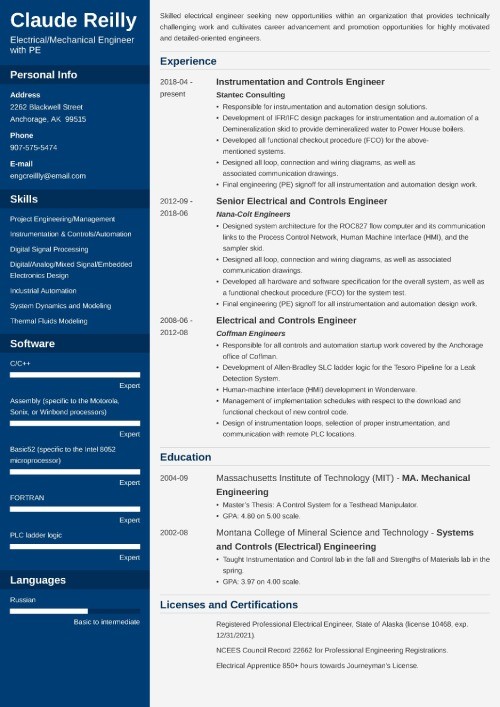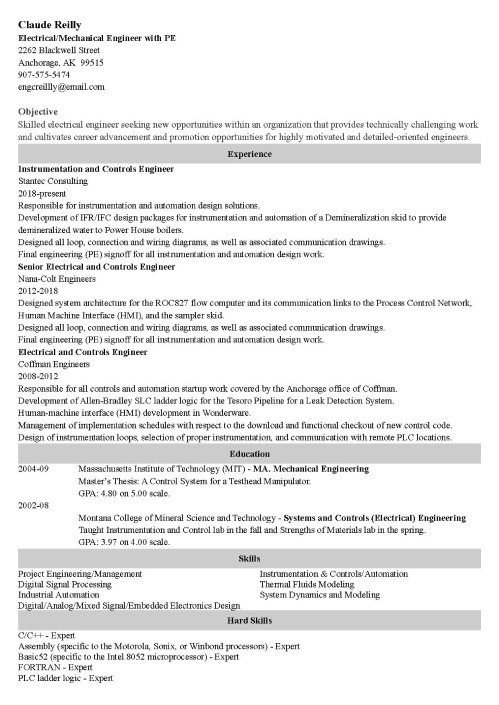What’s the difference between soft skills and hard skills? Hard skills are job-specific. Nobody’s born with them. Soft skills prove you’d be a great fit anywhere. They’re part of your personality, but you can also learn them. Before we analyze the intricacies of hard skills vs soft skills, you should know that you'll need a mix of both hard and soft skills to get hired. Let's begin!
This guide will show you:
- The difference between hard skills vs soft skills.
- Hard and soft skills examples employers want most.
- Why to pick slightly different soft and hard skills for each job you apply to.
- How to show soft skills vs hard skills on a resume to get hired faster.
Want to save time and have your resume ready in 5 minutes? Try our resume builder. It’s fast and easy to use. Plus, you’ll get ready-made content to add with one click. See 20+ resume templates and create your resume here.
Sample resume made with our builder—See more resume samples here.
Looking for guides about adding different skills on your resume? See:
- Language Skills
- Transferrable Skills
- Microsoft Office Skills
- Employability Skills
- Multitasking Skills
- Analytical Skills
- Administrative Skills
1. Hard Skills vs Soft Skills
What’s the difference between soft skills and hard skills? Employers want both. But which is which, and which ones matter most? See these quick facts on both types of skills:
What Are Soft Skills?
Soft skills definition: We define soft skills as abilities not unique to any job. Are you a great communicator? Do you collaborate with others like Steve Rogers? Those are softer skills.
For example:
But—you can’t just say you’ve got them and expect the phone to jangle. Scroll down to find out how to pick the perfect ones for a resume, and how to prove them so employers drool a little.
Give this guide a read if it's the soft skills that you're after: Soft Skills: Definition, List & 50+ Examples for Your Resume
What Are Hard Skills?
Hard skills are teachable abilities or skill sets that are easily measurable. We define hard skills as the technical abilities that fit the job. Normally, you can acquire hard skills in the classroom, in an online course, through books and other materials, or on the job.
If you’re in retail, that means closing cash drawers or restocking shelves. In tech? Your list of hard skills for resumes might have Java coding or network configuration.
Hard skills examples for accountants are asset management and account analysis. Hard professional skills for nurses are patient education and phlebotomy.
A prime example of hard skills for desk jockeys are computer skills.You’d think hard skills matter most.The truth is that demand for soft skills has been growing since at least 1980.
Another study, by LinkedIn, actually suggests that 57% of employers value soft skills more than hard skills. If you want to learn more about how to put hard skills on a resume for greatest impact, see this guide: Hard Skills for Resumes: Lists of Best Examples
What’s the Difference Between Hard Skills vs Soft Skills?
Hard skills relate to trained, technical knowledge while soft skills relate to personality traits. Hard skills are teachable and measurable and soft skills aren't.
Need more help? See these examples of hard skills and soft skills in the workplace:
Soft Skills Examples
- Interpersonal Skills
- Communication
- Collaboration
- Problem Solving
- Leadership
Hard Skills Examples
- Gathering Software Requirements
- Forklift Operation
- Marketing Skills
- Phlebotomy
- Financial Modeling
- Shelf Stocking
- IT Skills
What Do Employers Look For?
Employers look for proof you’ve got the right hard and soft skills. The throng of unwashed applicants says, “I’m hard-working, energetic, and a great communicator.”
That’s like a soft drink can that says, “Tastes Great!” It means nothing. You need to pick the exact resume skills the employer wants, then prove them. I’ll show how in a bit.
Use Both Hard and Soft Skills to Grab the Interview
Prove your soft skills list, and I’ll believe you can learn almost any hard skill. Prove your list of hard skills for resumes, and I’ll know you can already do the job.
The trick is knowing which skills I value most, then showing achievements on your resume that prove them.
Pro Tip: Do all these skills to list on resumes sound too complex? They’re really not. Let me show you how easy it is to pick the right few next.
The right hard and soft skills on your resume can make employers crave you like bacon-wrapped anything. See our guide: 99 Professional Skills to Include in a Resume (Best List of Examples for All Types of Jobs)
2. Soft Skills List and How to Pick the Ones Employers Want
What do employers want? You could put any of the soft skills below on a resume. But which ones will get you hired? The top ten soft skills in bold are the most important. That’s based on studies by LinkedIn and ICIMS. But—don’t pick soft skills for a resume from a generic list.I’ll show what to do instead below this list of skills.
List of Soft Skills
|
Leadership |
|
|
Collaboration/Teamwork |
Coordination |
|
Active Learning |
|
|
Interpersonal Skills |
Perceptiveness |
|
Good Attitude |
|
|
Strong Work Ethic |
Persuasion |
|
Problem Solving |
|
|
Flexibility/Adaptability |
Psychology |
|
Dependability |
|
|
Self Confidence |
Compassion |
|
Self Motivated |
Judgement |
|
Honesty |
Ethical |
|
Physically Fit |
A good combination of hard and soft skills will greatly help you secure a job interview. We analyzed 11 million resumes made with our resume builder, and here are the top 10 skills users add:
- Teamwork and Collaboration
- Problem-solving
- Excellent Communication
- Multitasking
- Attention to Detail
- MS Office
- Analytical and Critical Thinking
- Data Entry
- Project Management
- Team Management
How to Pick the Right Soft Skills to Get Hired
Will you get the job if you stuff your resume with all 28 skills in the list above? Or even the top 10 soft skills? Nope. Anyone can do that. But you can pick the few the hiring manager needs and snag the interview. How? Look at the job ad. Here’s an example job description from LinkedIn, changed slightly:
Examples of Soft Skills in a Job Description
Accountant wanted. Good written and verbal communication, bookkeeping, and data entry skills. Must be dependable and have a strong work ethic. Will perform accounting functions...
Eureka! You don’t have to ask me for a list of soft skills to put on resumes. The employer just told you what to say. List those qualities and you’re halfway to paycheck land. To go all the way, offer proof that makes the hiring manager say, “Wow.” I’ll show how in a bit.
Pro Tip: Don’t just ape the list of skills for resumes in the job ad. If you’ve got a couple extra skills they’ll love, by all means, add ‘em.
Want to write a resume that makes employers stutter when they call you? See our guide: How to Write a Resume that Gets You the Job: Writing Guide
Making a resume with our builder is incredibly simple. Follow our step-by-step guide, use ready-made content tailored to your job and have a resume ready in minutes.
When you’re done, our online resume builder will score your resume and our resume checker will tell you exactly how to make it better.
3. How to List the Right Hard Skills to Get Hired
Which hard professional skills should you show on your resume? There are about 30 soft skills—total.
There are thousands of hard skills. I could list the top 10 hard skills, but they’re all in the tech world because software engineers are in high demand. It’s better to find the top 10 hard skills for your career.
First, find the skills for resumes that match your field. We’ve got sample resume & guide combos for almost every job. Each guide has a resume hard skills list. But don’t stop there. Most applicants list too many resume skills. That’s actually a good thing, because it makes it easier for you to beat them.
Find the Right Hard Skills Like This
Zero in on the short hard skills list the hiring manager wants. Examples of hard skills? Our software engineer resume guide lists 18 hard skills for resumes. They’re skills like data structures, security, coding, open source, Java, SQL, and Python. If you put all 18 on your resume, you’ll get laughed out of the conference room.
But check out this example job description:
Hard Skills Examples in a Job Description
The perfect candidate for this job will have experience with Objective-C and Swift, plus strong iOS mobile development knowledge with Cocoa Touch and similar frameworks.
Well there’s your list of hard skills for a resume. The point? You don’t write a resume with a massive hard skills list, then machine-gun it out to every job offer you see.
You write a resume template, then tailor it to fit each job you apply to. Add just the list of hard skills the employer wants, plus a couple more. But—just like with soft skills, don’t just list your resume skills. Prove them. I’ll show how next.
Pro Tip: Don’t have the right hard skills for resumes to get the job? Online classes are plentiful and often short. Even a Lynda class can look great on a resume.
Ready to customize your resume to make hiring managers gawk like tennis fans? See our guide: How to Customize Your General Resume to a Specific Job
4. How to Show Hard and Soft Skills to Get the Job
Lucky you. You saw above how to pick the right list of hard skills vs soft skills. Now learn to prove your skills for resumes so recruiters mob you like Black Friday.
Can you really prove resume skills on a sheet of paper? Yes, you can. That is, you can prove them enough to get the interview. Enough to make the hiring manager say, “Let’s find out in person.”
How? With achievements. Pretend the job ad says, “We want a graphic designer skilled in (1) communication, (2) teamwork, (3) ecommerce, and (4) online layout. First, add a list of soft skills and hard skills for resumes. But to get the job, do this with your resume bullet points:
Soft and Hard Skills Examples on a Resume
- (2) Collaborated and (1) communicated daily with a marketing team of 15 people. Gave monthly progress presentations to the team.
- Facilitated team meetings for a project that increased revenue for (3) ecommerce clients 15%.
- Contributed to a customer site that (3) won a 2017 Shopify Ecommerce Design Award.
- (2) Collaborated on 30 projects to create images and (4) layouts for online content.
Whap. You just proved your skills for resume use. If the manager doesn’t double-take, his head was poorly designed.
Pro Tip: Notice how each bullet point above shows a benefit with numbers? Use percentages, dollar figures, and other metrics to show the power of your resume skills.
Want your resume to make employers worry you didn’t get their email? See our guide: Achievements & Awards to Put on Your Resume
5. Synonyms for Common Skills
The secret? Don’t look for synonyms to any of the words below. Please don’t say on a resume, “I’m likable,” or, “I’m highly skilled.” Prove it instead. “Wrote 1.5 million words of published articles in 2017” works better than a thousand synonyms for hard working.
But if you must, here’s a list of synonyms for common skills:
- Synonyms for Hard-Working: Dedicated, diligent. (The most prized of all the skills for resumes.)
- Personable Synonyms: Affable, amiable, easygoing, likable, great interpersonal soft skills
- Time Management Synonyms: Good at scheduling own work, fast, efficient
- Synonym for Patience: Composure, tolerance, restraint
- Synonym for People Skills: interpersonal skills, EQ, emotional intelligence
- Dependability Synonyms: Loyalty, trustworthiness
- Teachable Synonyms: Fast learner, active learner, quick study
- Opposite of Technical: Creative
- Synonym for Qualified: Certified, accomplished, capable, licensed, competent
- Highly Skilled Synonyms: Adept, able, proficient
- Proficient Synonym: Accomplished, gifted, talented
Again, hunting synonyms for skills for resumes is barking up the wrong decision tree.
Show measurable accomplishments.
Pro Tip: Use one personable synonym or teachable synonym at the beginning of your resume summary. Otherwise, give the fancy adjectives a pass.
Use spicy resume words to keep employers reading like Stephen King dreamed up your resume. See our guide: 240 Resume Action Words & Power Words to Make Your Resume Shine
Plus, a great cover letter that matches your resume will give you an advantage over other candidates. You can write it in our cover letter builder here. Here's what it may look like:
See more cover letter templates and start writing.
Key Takeaway
Here's a recap of hard skills vs soft skills for resumes:
- Soft skills are traits that make you a good worker. They’re things like work ethic, organization, communication, collaboration, and leadership.
- Hard skills are abilities you learn in school or on the job. They’re things like C# programming, marketing campaign management, and financial forecasting.
- In other words: Hard skills are your abilities and competencies necessary to do the work. Soft skills are your personal qualities that impact how you do it.
- Employers want a mix of hard skills vs soft skills on your resume. Find the ones they value most in the job ad.
- Don’t just list skills on a resume. Prove them with measurable achievements in your bullet points.
About Zety’s Editorial Process
This article has been reviewed by our editorial team to make sure it follows Zety's editorial guidelines. We’re committed to sharing our expertise and giving you trustworthy career advice tailored to your needs. High-quality content is what brings over 40 million readers to our site every year. But we don't stop there. Our team conducts original research to understand the job market better, and we pride ourselves on being quoted by top universities and prime media outlets from around the world.





